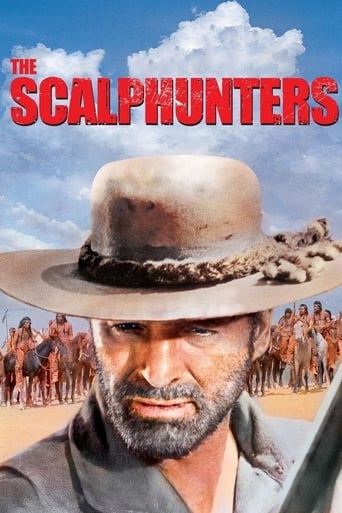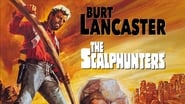Uriah43
"Joe Bass" (Burt Lancaster) is a trapper who has just finished his winter occupation and is heading back east to trade in his furs. Unfortunately, he encounters some semi-friendly Kiowa and they demand his furs in exchange for a black slave named "Joseph Lee" (Ossie Davis). Although Joe Bass doesn't want or need a slave, he has no choice but to allow the trade to transpire since the Kiowa outnumber him 12 to 1. But as they ride off he is determined to get his furs back one way or the other. Meanwhile, the Kiowa fall prey to a band of savage scalphunters who end up taking the furs after killing the Kiowa. So Joe Bass now has a different adversary to retrieve his furs from. Anyway, filmed in 1968 this movie has a not-too-subtle "message" about racism the director (Sydney Pollack) felt compelled to impart. No doubt that decision probably delighted the politically-correct critics during this time. However, regardless of how well-intentioned the motives may have been it was a bit too blatant in my opinion and detracted from the entertainment value this movie may have had. Along with that, the humor just wasn't that funny. Additionally, I thought Shelley Winters (as "Kate") was miscast for her part and neither Burt Lancaster nor Telly Savalas (as "Jim Howie") seemed to fulfill their potential. That said, for all of these reasons the movie seemed rather flat and lackluster to me. In short, it could have been better.
weezeralfalfa
This unique very entertaining film is, in part, a traditional Western, with several skirmishes involving "Indians", a gang of outlaws, and a lone trapper, who comes to grief from both. In part, it is a slapstickish reluctant buddy comedy involving Burt Lancaster, as trapper Joe Bass, and escaped slave Joseph Lee(Ossie Davis), as well as the often caustic patter between complaining floozy Kate(Shelly Winters) and Jim Howie(Telly Savalas), boss of the fleeing outlaw gang. The trade of Joseph Lee forced upon Bass by the Kiowas in exchange for his year's catch of furs and pack horse serves as a parody on the exchange of desirable lands or other property for much poorer or diminished lands or goods frequently forced on various Native American tribes.Joseph Lee hopes to get across the Mexican border, where slavery is outlawed and blacks welcomed. He's willing to do whatever he has to to accomplish this. Joe Bass's goal is to retrieve his furs and pack horse. At first, Lee plays along with helping Bass retrieve his furs, but when he is captured by an outlaw gang who stole Bass's furs from the Kiowas and who happen to be heading for Mexico, his loyalty between Bass and the outlaws waivers. Both talk down to him at times as if he were intrinsically inferior, and talk about selling him on the slave auction block. Part of the comedy relates to the fact that Lee clearly has(unbelievably) absorbed far more high class white culture from his former owners than either Bass or the outlaws ever will. Remember, this film was released in 1968, the year Martin Luther King was assassinated.Bass nearly recaptures his furs several times, with or without the help of Lee. In addition to his uncanny ability to tract down the location of the offending party and to escape their superior numbers, he surrealistically pushes quite a few 1000 lb boulders down on his enemies, then later poisons a water hole with locoweed to make their horses revert to untamed bucking broncos(an idea he generously gives his horse, Jughead, credit for).In the final showdown between Bass and Howie, Lee has to decide whom to help, with the consideration in his mind of how he might best get to Mexico. After both unsuccessfully attempt to leave the other helpless, Lee and Bass engage in a long slapstickish fight in a muddy water hole, ending in a draw, both covered with gray mud, thus enhancing the impression of equality. But, in a sense, they are both losers, because the Kiowas return. Taking advantage of the distraction of Lee and Bass and the much weakened outlaw gang, Two Crows reclaims the contested furs and pack horse, as well as the now unclaimed Shelly Winters and what's left of the gang's supplies.Some think the film should have ended with Lee successfully escaping both Bass and the outlaws, with Bass's furs and horses to boot, something he nearly accomplished. I can certainly see merit in that view. However, the furs and horses don't rightfully belong to Lee. They rightfully belong to either the Kiowas or to Bass (depending on your viewpoint). Besides, we needed to give Lee an opportunity to show that he can duke it out with Bass, as part of the demonstration that that he is at least as respectable as Bass and the other white men, if not more so. Yes, the parting scene leaves us wondering what became of Bass and Lee, the two main characters, and thus is less than satisfying.Quite a few slaves actually did make it across the Mexican border, often with the aid of Mexicans temporarily or more permanently in Texas. Mexico long refused to cooperate in efforts to recapture these slaves. In 1857, Mexico formally declared any slaves crossing the border to be free. Thus, much of the US army was given the responsibility of reducing this flow(mostly unsuccessfully) and Mexicans were prohibited or much restricted in much of Texas....I should also point out that the Kiowas and Comanches were long term military allies during the 1800s, thus Lee's story about a Kiowa raid on his host Comanches is unlikely, historically.
tedg
If you happen to be alive and watching films in the late 60s, you'd be immersed in a period richer than anything we have seen since, I think. People just seemed more receptive to fundamental reinvention where today its assurance we need.There are lots of obvious examples of this. Here's a much less obvious one, and it may be hard to see why.Superficially it is a slight project, a slim entertainment in a common form: a genre film that references the established notions of western justice that has in the standard interstices a story of racial justice earned. (You have to imagine that in those days it was commonly accepted that the black "man" had — by dint of intense perseverance — finally achieved a place at the table. Also, you have to place yourself in a place where the western was still taken seriously and without irony as the zone where American values were handled, reaffirmed.)Its not obvious today, because notions of race have since shifted. But this was a fairly radical film in its time: more so say than "Guess Who's Coming to Dinner," or "Lilies of the Field." The idea of weaving these two notions of justice together was pretty radical, and extremely ennobling. It was a special event then. Today, its old candy.And that's the power of this, knowing what it was and seeing how tepid the "message" is. Today, we're as likely to see the whore with the golden heart as mattering.Ted's Evaluation -- 2 of 3: Has some interesting elements.
Nazi_Fighter_David
"The Scalphunters" opens with an illiterate frontier fur trapper named Joe Bass (Burt Lancaster) refusing to trade his furs, with the Kiowa Indians, for a runaway field slave… But at the end, he is forced at gunpoint to do that and Bass finds himself, in one moment, the owner of Joseph Lee (Ossie Davis), an escapee from Louisiana, formerly of the Comanche tribe, until stolen by the Kiowas… Lee, an African—slave by employment, black by color—results one of the highest educated families in Louisiana, who can read and write… Lee's intention was to circle south, as far as Mexico, because the Mexicans have a law against the slavery trade… Bass' immediate plan was to catch up with the Kiowas and get back his pack horse and furs… But his plan soon failed when a band of scalphunters led by a dangerous double-crosser, Jim Howie (Telly Savalas) attack the poor Indians killing almost all of them and taking, by the way, Bass' property… Bass— a man who moves mountains to get what he wants— stampedes their wagons and makes the scalphunters' horses dangerous to ride… The sweetest, and in some ways the funniest moments come out when Bass talks to his horse… In one scene, he gets so excited, and turns back to his stallion saying: "By god, you have got an idea!" Telly Savalas makes Kojak a charmer, but in Pollack's film he is a psychopathic bounty hunter who slaughters a dozen Indians… Kate (Shelley Winters)—a cigar-puffing doxy qualified to do things to any man—is sick about her lover's wagon… She complains that she lives like a squaw… Kate's dream was to live like a lady in a fancy house with servants… Winters delivers the best line of the whole movie when she exclaimed at the end of the film: "What the hell? They're all men."Ossie Davis comes out with a real sense of humor… In one scene he explains to Kate the benefits of the common cactus, known to the Comanches as Maguey… He makes her believe that this plant was used in the ancient times by the Queen of Sheba to restore the natural oils to her beautiful blond hair… It was nice to see Nick Cravat in a modest role as one of Savalas' men… As you remember, Cravat was ideally cast as Lancaster's sidekick, Piccolo, in the flamboyant "The Flame and the Arrow" in 1950, a spoof of the Robin Hood genre, set against the castle battlements and banquets halls of medieval Lombardy






